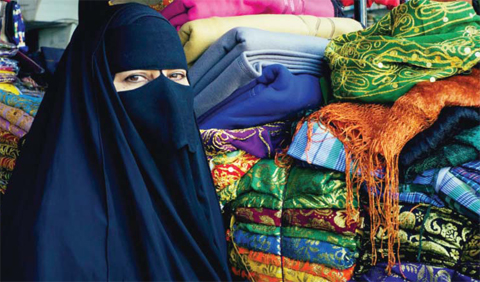 Umm Talal at her kiosk.
Umm Talal at her kiosk.One of only three female vendors left at the famed Souq Al-Hareem in Kuwait City, Umm Talal arrives early every morning to open her shop. Her assistants usually come a few minutes before, often to find that it's been vandalized by unknown persons, with hateful gifts of feces or urine left near the kiosk for the aging merchant.
Umm Talal has run this shop since she took it over from her mother, who opened in the 1940s. The souq which is located behind the Mubarakiya Market has become quiet, not teeming with life as it was in its former glory, and who goes there usually comes for a particular purpose. The wafting odors of clorox and sterilisers coming from the forefront of the souq, where her kiosk is, overshadowed the scent of folk remedies, incense shops and the restaurants around.
"The three of us we are exposed to vandalism, Umm Ali and Umm Hussein and myself. I feel that someone wants to get us out of the market. In the past, there was a dishonest security guard that stole our merchandise. Also, we sometimes get vandalized by teenagers. Even in one National Day, some of them stole two Kuwaiti flags I had put them on the kiosk," she complained.
Souq Al Hareem (The Women's Market) is narrow alleyway of kiosk in a side market next to the Souq Al Mubarakiya in Kuwait City. At its high point, dozens of female vendor sold traditional clothing, Arabic Kohl (eyeliner), siwak (A teeth cleaning twig), dayrum (A plant used to beautify woman's gums and whiten their teeth), clothes and other accessories.
Umm Talal says that, today, the remaining three vendors bring traditional gowns from the UAE in addition to locally produced clothes. "Beside the traditional dresses, prayer robes, veils, and apparel for women and children specially designed for national holidays," she added.
A disappearing heritage
Built in the 1950s under the patronage of the late Shaikha Mudhi Al-Mubarak Al-Sabah, the kiosks were dedicated for Kuwait's female vendors only. Since 2012, the old market, under the superintendence of the Chairman of the Kuwait Voluntary Work Centre, Sheikha Amthal Al-Ahmad Al-Jaber Al-Sabah, has been renovated and restored.
But despite its renovation, the souq has lost most of its vendors and remains under threat. Under the souq's governing regulations, vendors may only be the female Kuwaiti owners themselves. UmmTalal believes that the main reason why Souq Al-Hareem is covered in a deep sleep is the fact that many of those ladies have grown older and can no longer manage the daily work hours or tasks needed to run the shops. Some subcontracted their kiosks to foreigners, which is illegal. There are 68 kiosks at Souq Al-Hareem. Only three are still occupied. "Many of those were closed down by the Municipality either for subcontracting or selling unpermitted materials," explained Umm Talal.
Vendors have also been harassed though it's unclear who is vandalizing the kiosks. Daily or regular visits from Municipality inspectors also seem to focus more on targeting the women's kiosks than other vendors in the same vicinity. The Municipality have denied the daily visits and said that inspectors check all the public markets in general once a week to ensure they are complied with regulations. The source mentioned that they have the authority to close any vendor if inspectors report a repetitive explicit and deliberate violation.
For one of the last remaining vendors, time is running out and with the closure of those shops might go the women's souq and its history forever. "I cannot imagine my life without coming here every day.. Despite of all the harassments, I love my kiosk. But, at the same time, I don't know if my children are willing to take care of it after me though my daughter who's recently graduated from high school, tends show some interests in entrepreneurship," Ummm Talal concluded.
Story and photos by Athoob A. Alshuaibi










